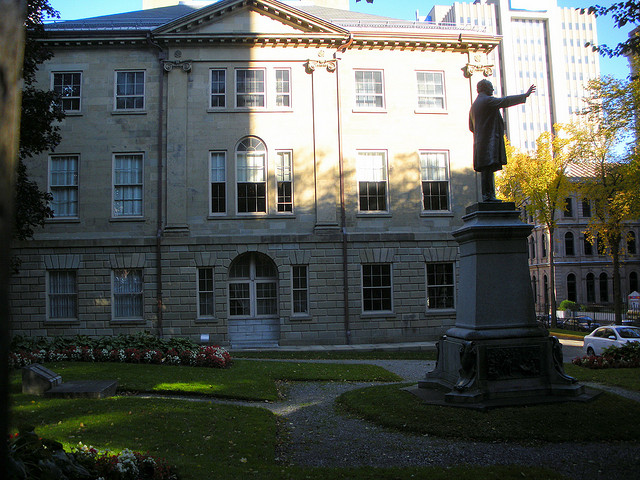Chip in to keep stories like these coming.
It’s that peculiar time again — roughly midway (already!) in a government’s life — when the exhilaration of a new voyage hits the potholes.
Just before last spring’s budget, I was tempted to say that the Liberal government of Premier Stephen McNeil seemed to be doing all right, everything considered. Then I remembered that’s what I said about the previous NDP government at about the same point, just before it started flaming out.
Good thing I kept my mouth shut. The bust-up over the politically bungled changes to the film tax credit was one thing, but there’s more. It has been blindly cutting the funding of non-profit groups, mainly in the health field.
In a stupefying statement, Community Services Minister Joanne Bernard said government “didn’t have much information” on what these groups did or whether “the work they were doing was working.” Knowing nothing seems hardly the proper basis for government action. How much more of this is going on, especially as government mulls the privatization of the auto registry and other things?
The Liberals are sliding into what the NDP were doing at this point. After a round of early studies and considerations, they took to what we could call bunkering — making decisions in a vacuum with scant feedback from the real world. To some degree, this would be the result of the standard Nova Scotian political habit of coming to power without a clue about governing, having spent all political energies jerking people’s chains on hot issues during the campaign.
The Liberals took two of last week’s byelections and came within a whisker of taking the third. Their reaction was one of relief rather than victory, and rightly so. They have a chance to pull it back together — and proper public consultation is key — but time goes quickly.
And if they don’t get it together, then the next question is who is the challenger? The byelection results give some intimation of that, too. The NDP won Dartmouth South, although by a whisker, and remained a solid second in the two they lost in Cape Breton. This, it should be remembered, is a party without a leader — they’re in a leadership race. It should be remembered, too, that they got a few thousand votes more than the Conservatives in the last election, although far fewer seats.
The NDP has surprised me. After their debacle in government and having lost a large chunk of their base — mainly environmentalists and longtime leftist supporters who felt shunted aside — what remains has come back swinging more or less as they did before they ever came to power, hammering at the McNeil government on health and social issues primarily. In other words, amazingly, the party appears to have life, a base, functioning political machinery, and is an established contender for government.
With the Conservatives, it’s another story. They had a small uptick in their vote in the byelections and these weren’t their ridings to begin with, but the good news ends there. In fact, the conversation I’m picking up regarding the Progressive Conservatives is that Jamie Baillie isn’t clicking as leader and that that’s a problem.
Baillie came with wide experience in business and government, was chief of staff to former premier John Hamm, was known as a “progressive” conservative, was billed as the “smart guy” among last election’s leaders, and had notably been head of Credit Union Atlantic.
I thought that was all a good background for politics and that the public might warm to him as they did to Hamm. Instead, he’s been talking in bumper-sticker phrases (“job-killing carbon tax”) worthy of the Tea Party, and his pronouncements on economic matters especially sound like they’re addressed to an inner circle of elite small-businesspeople.
I’m still puzzling over his main planks from the last election — freezing power rates for five years (a repeated catastrophe in the 1970s and ’80s) and eliminating the small-business tax and thereby creating thousands of jobs (a similar promise sank the Tories in the last Ontario election; quite properly, nobody believed it).
Meanwhile the last Corporate Research Associates poll showed the NDP up — even without a leader — and the Tories down (and the Liberals down, too, but still at 50 per cent). Pollster Don Mills tied the NDP uptick to the NDP victory in Alberta and the risen fortunes of the federal NDP. By the same token, the provincial Tories could be suffering from Harper’s unpopularity in these parts.
True, polls and byelections at the halfway point don’t mean a lot except to party machines and morale. The game is still the Liberals’ to lose, but there’s a list in the McNeil government’s ship, and that’s an issue for all of us, not just the government.
If they’re back in the same rut as the NDP got into, it’s a larger question of how we govern ourselves in Nova Scotia.
Ralph Surette is a freelance journalist in Yarmouth County. This column was first published in the Chronicle Herald.
Photo: Tom Flemming/flickr
Chip in to keep stories like these coming.



